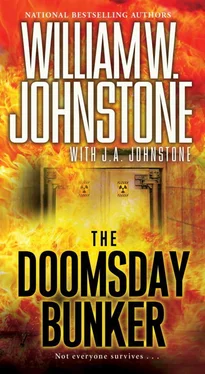“Anyway, to get back to what we were talking about, what I envision down here is a meritocracy,” Moultrie went on. “What can you do, and how good are you at it? That’s what’s really going to count. And because of that, at some point I probably will have to do some picking and choosing as to who gets in here. Now, take you for example…”
“I’m a writer,” Larkin said. “I’m not going to be much good to you.”
“Yes, but you’re also an ex-Marine.”
Larkin had to correct that. “Former Marine. There are no ex-Marines.”
“Once a Marine, always a Marine. Sorry. I knew that. Slip of the tongue. The important thing is, you have an exemplary military record. You’ve been in combat, you’ve commanded men, you know how to get the job done, whatever it is.”
“You’re going to have a military force down here?”
“A security force,” Moultrie said with a shrug. “I’d like to think that everyone will be on their best behavior at all times, but I’m realistic enough to know that won’t be the case. It’s possible we’ll have to step in and restore order now and then. When and if that happens, I want men I can count on. I think you could be one of those men, Pat, along with your friend Adam.”
“Sounds like you know quite a bit about us,” Larkin said as suspicion stirred again in his mind.
“An arrangement like this requires trust on both sides,” Moultrie said. “And you know what they say… There aren’t many secrets left in the world.” He smiled and gestured again. “Let’s look around some more.”
They walked along the main corridor, Moultrie opening doors to show Larkin storage areas and a dining area with a large kitchen attached to it. “We’ll provide meals for people who prefer that, or people can cook in their own units, sort of like an assisted-living center for the elderly. Everyone’s food consumption will be kept track of, though, either way. There’ll be enough rations stored down here to keep the population alive for a number of years, plus we intend to grow crops hydroponically—that area is down on the lower level, too—and we’ll be raising both rabbits and chickens, as well, to stretch our food supplies. But it’s unlikely we’ll be able to feed ourselves indefinitely.”
“Your population will grow, too,” Larkin pointed out.
“Undoubtedly. And we probably won’t have many elderly residents, so they won’t die out at the same rate as babies are born. But we’ll deal with that as it happens.”
Larkin pointed through an open door into a room lined with sturdy-looking cabinets. “What’s this?”
“Our armory. We’ll have some weapons to start with, and residents will be allowed to bring along their personal firearms, at least a certain number. But they’ll all be kept here and used only for practice and in emergencies.”
“Some people won’t like giving up their guns.”
“We’re talking about a situation where there are a lot of things people don’t like.”
“Armageddon,” Larkin said.
Moultrie shrugged. “Or a reasonable facsimile.”
“You have medical facilities?”
“An infirmary and an operating room, plus a large supply of every drug we can think of. A woman like your wife will be a very welcome addition to our ranks, Pat.”
That nickname was getting under Larkin’s skin, but he still suppressed the urge to say anything about it. Instead, he said, “So you know she’s an ER nurse.”
“Of course. A very highly regarded one, too. Honestly… you two are just about perfect. I couldn’t ask for a better couple to join us.”
“We’ll have to do a lot of thinking and talking about it,” Larkin said. He added grudgingly, “I have to say, though, you seem to have thought of everything. This looks like a viable operation.”
“Just as viable and self-sustaining as I can make it,” Moultrie said. “You have my word on that.”
“Where are your generators?”
“Down on the lower level as well. We actually have our own power plant, as well as equipment to recycle both air and water.”
“So we’ll be drinking our own piss.”
“You’re already doing that if you have any sort of municipal water supply. We just—you’ll pardon the expression—streamline the process.” Moultrie pointed up. “There will be sensors in place on the surface to instantly detect any sort of radiation or unusual chemical or biological activity. We can monitor that around the clock and keep the shelter completely sealed off as long as there’s the least bit of danger. Food, clean air and water, sustainable resources, and enough hardened steel and concrete to withstand anything up to a ground zero nuclear hit… what more could you ask for when it comes to survival, Patrick?”
The guy was good, Larkin had to give him that. Moultrie must have noticed the slight tightening of his mouth when he called him Pat and adjusted accordingly.
“You say there are separate apartments in the old missile silos?”
“That’s right. Twenty in all, with full kitchens, two bedrooms, and two baths. I wouldn’t exactly call them luxurious, but they’re very comfortable. If it weren’t for the lack of windows, you’d think you were in a nice apartment house.”
“How much?” Larkin asked bluntly.
“I’ll give you our price list when we get back to the office,” Moultrie said.
That didn’t bode well, Larkin thought, if it cost so much to get in here that Moultrie didn’t want to say the numbers out loud. Or maybe it was just easier to hand out a price list. Larkin supposed he would find out.
“Also, you don’t have to come up with the entire cost at once,” Moultrie went on. “You can put down a deposit to hold your space and pay it off either in installments or in a lump sum when everything is complete and the place is ready to move into.”
“But once it is, you’ve got to be paid in full to get in if the shit hits the fan.”
“That’s the way it works,” Moultrie said quietly.
“Survival on the layaway plan,” Larkin said.
May 25
As Larkin was driving away from the Hercules Project, he had the satellite radio in the SUV tuned to a news channel. The announcer was talking about a series of riots in Indonesia that had resulted in more than a hundred deaths before being broken up by a typhoon that swept in and killed several hundred more. Meanwhile, one of the socialist countries in South America was descending further into chaos and starvation, one more domino toppling in a seemingly endless chain. Larkin grunted and switched the station to some music. He didn’t care what kind of music it was; he just wanted to hear something other the constant litany of death, discord, and destruction.
As he drove through the countryside west of Fort Worth, it was hard to believe there was so much terrible news in the world. The landscape was green and beautiful, with nice houses tucked in among trees and cows and horses grazing in the fields. From some of the hills, he could see the downtown skyscrapers about ten miles away, shining in the sun.
A vision suddenly appeared in his head: those buildings disappearing in an instant, in the searing fireball of a nuclear explosion. Adam Threadgill had mentioned growing up in this area and being scared of such a thing when he was a kid. Larkin’s childhood had been spent in Kansas and Nebraska, without any military targets nearby, but even so he could remember what that Cold War paranoia felt like.
Only it wasn’t paranoia if somebody was really out to get you, he reminded himself, and for a while there, the United States and the Soviet Union hadn’t been all that far from actually launching nukes at each other. Larkin had been born a few years after the Cuban Missile Crisis, so he didn’t remember that incident himself, but it had had enough of an effect on the nation’s consciousness that he had been aware of it for as far back as he could remember. He remembered hearing fear in his father’s voice when he talked about the Russians… and in young Patrick’s mind, his dad had been invincible, never afraid of anything. If he worried about being bombed, there must be something to it.
Читать дальше









